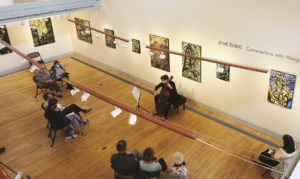“This is the first indoor [musical] event that anyone on the Cape can experience since February,” said David Kuehn, executive director of Cotuit Center for the Arts, introducing a solo recital by baroque cellist Phoebe Carrai that was held there on Sunday.
Until that moment, it had not sunk in just how long it had been since I last heard classical music live. I was sitting in the balcony at the Cotuit Center, a program resting precariously on my lap. Below, about 20 masked audience members occupied scattered seats.
“Bach: Before and Beyond” was the first in a series of concerts that Carrai is planning at Cotuit. The next, on Oct. 25, is with harpsichordist Peter Sykes and violinist Cynthia Roberts. All three are on the faculty of the Juilliard School. There will also be cello duos with Jennifer Morsches on Nov. 22, and a holiday program on Dec. 13 with members of Harvard Baroque Chamber Orchestra, of which Carrai is director.
The concert that I attended was recorded, and will be available on artsonthecape.org starting next week, until the end of the month, for $15.
When Carrai started tuning her baroque cello, my whole body relaxed. It was like a sound from another time: deeply familiar, yet distant. It’s relatively absent from virtual performances.
The baroque cello, unlike the modern cello, has gut strings. These lend the instrument a warmer, mellower sound. Because they have less tension than metal strings, they also have to be tuned more frequently. Carrai retuned between pieces, reminding us: this is real, this is live.
Carrai began her first piece, Domenico Gabrielli’s Ricercar No. 7, with a fiery improvisation in the key of D minor. The piece is full of contrasting sections, which Carrai delineated with different tempos and articulations. Carrai is a master of creating different textures with her bow, which she wields like a painter’s brush: dry, crunchy, or bell-like.
Carrai’s ornaments and rapid diminutions injected vivacity. The climax is a bariolage passage, which resolves on an open octave that sounds like the heavens are opening up. You will know it when you hear it.

Next, Carrai played Bach’s Suite No. 3 in C Major. Carrai, who has recorded all six Bach cello suites on Avie Records, plays with such character and rhetorical expressiveness that she communicates the music with her whole being, even under a mask.
The slurred, scalar passages in the prelude were like ripples in water. Carrai faltered a bit in the courante, but this show of humanity was oddly welcome, and when she later nailed the courante in an encore — in memory of Lucy Cromwell, a Cotuit Center member who died in June — it was triumphant. She struck some of the low, brisk notes in a way that was like bowed pizzicato.
Especially beautiful was her delivery of the sarabande, a slow movement with three beats to the measure. The way she played it was comforting, like a hug. In the gigue, each time she hit the low G, the sound filled the room in waves.
Last on the program were two capriccios by Dall’Abaco. Though this composer straddled the Baroque and Classical eras, the way Carrai played the sections with subtly different characters harkened back to the Gabrielli. In the G minor capriccio, each time Carrai hit the harmonic A, her sound was almost celestial. In the E minor capriccio, it was smooth and crystalline, almost like an organ.
When she was done, an audience member asked Carrai if it was true that the cello is closest to the human voice. “I believe that has less to do with the timbre of the instrument, and more with the person playing it,” Carrai replied.
In a time when singing in public is potentially dangerous, Carrai sings, masked but unencumbered, through her instrument.
